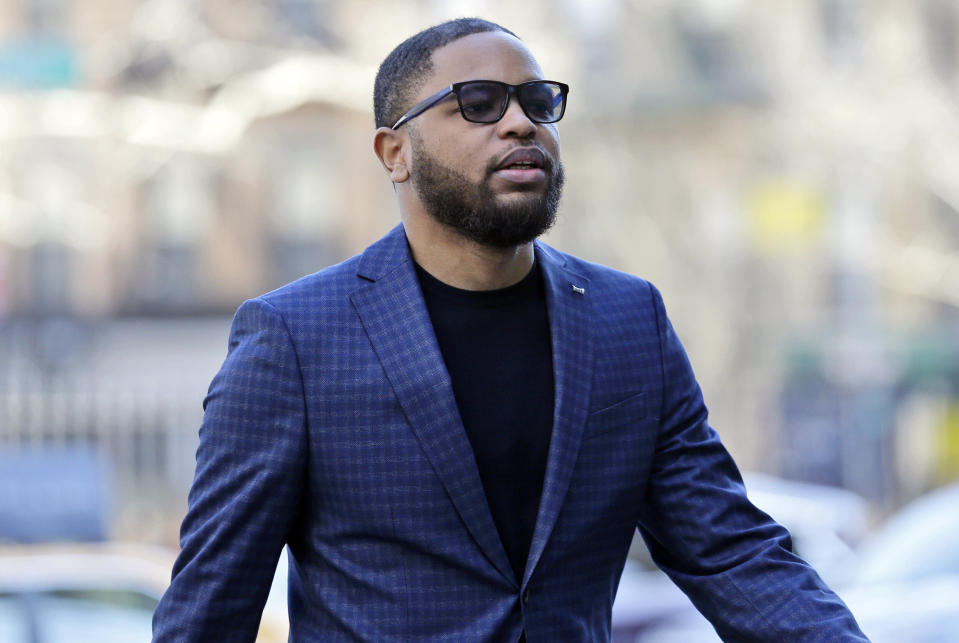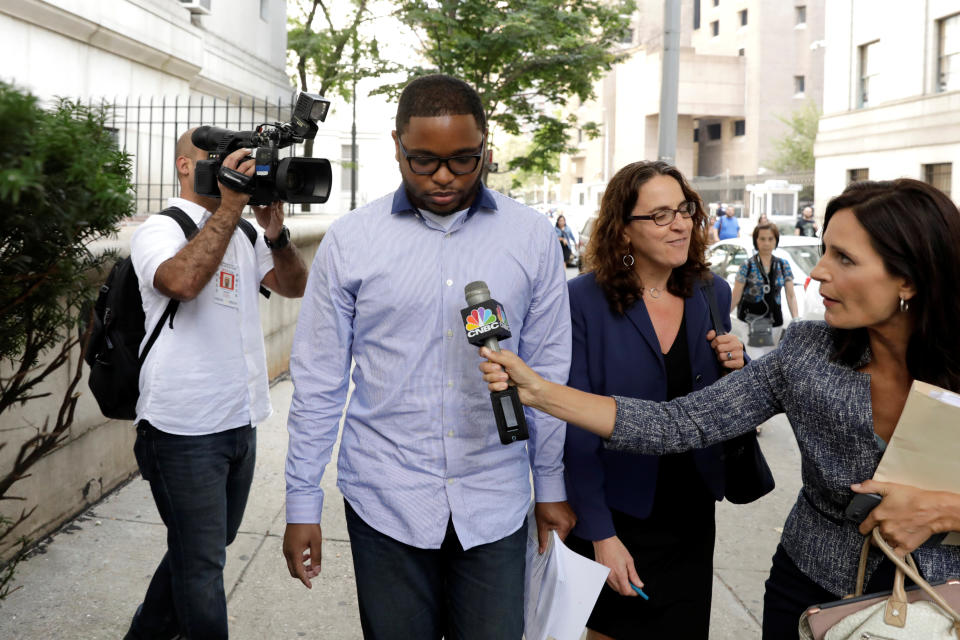How one basketball middleman exposed college amateurism and clowned the FBI
NEW YORK — College basketball’s improbable truth-teller was on the witness stand, sporting black-rimmed glasses, a quick, caustic wit and a perspective that caused everything from nodding heads to straight-out laughter from the jury box.
Across a few hours here Wednesday, Christian Dawkins, a 26-year-old basketball middleman, made a mockery of not just college sports’ obsession with amateurism, but with the bribery case brought against him by federal prosecutors.
It was one heck of a performance, an already-convicted felon standing trial for a second time, somehow coming across as the most reasonable and honest voice in college athletics.
“This whole idea that this is an amateur world is not real,” Dawkins said.
No, no it isn’t and that much is clear to anyone who has listened to a week-and-a-half of evidence, testimony, FBI-intercepted phone calls and recorded business meetings here. It’s clear, really, to anyone who has been paying attention the past half century.
Dawkins took the stand facing significant evidence against him that he was guilty of bribing college basketball coaches. As such, the only way to defend himself was to lay it all bare — the world he operated in and the awkward efforts of undercover agents to criminalize his behavior.
He’s still likely to be convicted but Dawkins certainly had himself an afternoon here as he poked holes through and fun at his two chief nemeses — the NCAA and the FBI.
He pointed to the fact that through his work as a runner for an established sports agency and then later on his own through the budding LOYD Management, he followed a model where agents fight each other off to give money to anyone with any NBA potential long before they arrive at college.
“By the time the players get to the college campus they already have a deal [with an agent],” Dawkins said. “... I could be mistaken, but there is no one signing players that isn’t paying people … Basically anybody who was in charge of the kid’s recruiting process was being paid.”

Essentially, everyone is getting money. Everyone. And usually by more than one entity of agents, financial planners or business managers, all desperate to get a future multimillionaire NBA client. And then there are the college coaches, boosters and others throwing money around too — on Wednesday an Arizona assistant coach said on a recorded phone call that head coach Sean Miller was paying star player DeAndre Ayton $10,000 a month.
That’s how valuable the players are and the wheels of capitalism are never going to stop because of the NCAA rulebook. That's true even if the FBI decides it should spend years and millions of dollars trying to bust some low-level hustlers via undercover agents, seed money, Manhattan yachts and sweetheart cooperating-witness deals for actual felons.
Dawkins had no problem paying players. Actually, he reveled in it, believing he was righting a wrong that too often put kids from poor families at a disadvantage. Maybe their parents wanted to travel to watch them play. Maybe they needed money to fit in amidst wealthy student bodies. Maybe they just deserved it.
“The NCAA rules restrict [pay] and they can’t even work,” Dawkins testified. “Because the players can’t receive [pay] from obvious reasons such as ticket sales or their name, there has to be a third [party].”
Dawkins was glad to be that party, especially if later his new management agency would be repaid by having the player sign up as a client. He was hardly alone. He said he didn’t know of one NBA agent that operated differently.
“Everyone was paying players,” he said.
His problem came when he started his new firm at the age of 23 and was hooked up with a guy named Jeff DeAngelo, who was supposed to be a 30-something real-estate tycoon but was really an FBI agent. Dawkins needed money for his agency and DeAngelo had it — to the tune of $185,000.
They met, along with financial adviser Munish Sood, on a two-story yacht just off Battery Park here. Fancy whiskey was poured. An envelope with $25,000 was handed over. Everything seemed good.
“When I stepped on [the yacht] … I thought, ‘Wow, this dude must have some real money,’” Dawkins said. He admits he was naïve and overly impressed because of his blue-collar Michigan upbringing.
“Ain’t no yachts in Saginaw,” he said with a smirk.
Such lines are how he connected with the jury, who seemed to be in favor of his pay-the-players argument and were generally enthralled with the way he laid everything out.
Another time he was asked to explain what the government claimed was a list of coaches he was capable of bribing. His defense attorney, Steve Haney, noted that the list was really just of coaches Dawkins knew, not that he could bribe, and a prosecutor witness was lying when he characterized it otherwise. After all, it included Christian Dawkins’ own father, Lou Dawkins, an assistant at Cleveland State, which isn’t exactly a powerhouse that produces lots of NBA talent an agent would want to bribe.
“My dad is here [in court] so I don’t want to throw him under the bus,” Dawkins said, with a laugh. “But they aren’t the greatest team in the country.”
The entire courtroom laughed.
And with that, the vaunted bribe list was reduced to evidentiary rubble.

Dawkins’ argument was strong. He still faces what is expected to be a lengthy and heated cross examination Thursday, but he did major damage to the government’s narrative that he bribed college coaches so they would steer their players to his agency — simply by pointing out that since all the players are already accounted for by then, such a plan was dumb.
“It wouldn’t make common sense to pay the college coach,” he testified.
The problem was, he said, DeAngelo, the ambitious FBI undercover agent, was hell-bent on doing just that. The defense played repeated phone calls showing Dawkins calling such an idea “idiotic” with co-defendant Merl Code, laughing at DeAngelo’s stupidity with Sood and even trying to explain to DeAngelo himself why it was such bad business.
Dawkins kept arguing that they should spend the money on players, families and handlers, not college assistant coaches who would just take it and spend it on their own recruits.
“If you just want to be Santa Claus and just give people money, well [expletive], let’s just take the money to the strip club and just pay for hookers,” Dawkins told DeAngelo on a recorded phone call.
Even though the business was set up with Dawkins as a 50 percent shareholder and DeAngelo at just 35 percent (Sood got 15), Dawkins needed money, so DeAngelo had all the real power.
“‘I’m funding you, this is what you’re going to do,’” Dawkins said DeAngelo told him. “If Jeff didn’t fund this company I’d be broke, living with my dad … again.”
And, again, laughter.
Dawkins said he decided to go along, even if he was baffled that someone would want to engage in a worthless business strategy.
“It makes sense now because he was trying to set us up to bribe people,” Dawkins said.
Yet Dawkins said he actually just wanted DeAngelo to think he was bribing coaches, so the coaches he brought in front of the FBI agent were actually his friends. At various meetings they sat with DeAngelo, took his cash and then later, according to Dawkins, returned the money.
At one point, Dawkins set up a meeting at the Cosmopolitan Hotel in Las Vegas with his friend Preston Murphy (an assistant at Creighton), DeAngelo and an investor named Marty Blazer, who was trying to beat five felonies by cooperating with the FBI and remains the most dishonest person in this entire dishonest scandal.
The goal was to prop Murphy up as worthy of a $6,000 payout because he’d be able to deliver a future NBA player he coached named Marcus Phillips.
DeAngelo gladly bought it and the money was handed over. The problem? There was no NBA prospect out of Creighton named Marcus Phillips.
“He was just a random person we made up,” Dawkins said.
The jury loved it.
After the meeting, Dawkins testified, Murphy returned it to Dawkins in a lobby bathroom downstairs. Then, the next day, bank records presented by the defense suggest Dawkins fed it back into the LOYD account via a Vegas ATM so it could be used to pay actual players. Bank records showed he repeatedly did that, meaning LOYD Management wasn’t bribing college coaches, it was mostly just bribing itself.
“We’re just going to take these fools’ money,” Dawkins said on a wiretapped call to Code.
In this lunatic world that the NCAA has created and the FBI has criminalized, it all made sense. DeAngelo was conning Dawkins and so Dawkins was conning DeAngelo. They were both too eager to believe they were cheating the other that they missed the signs they were being cheated.
That’s the sport though. Everyone was buying and everyone was selling. Nothing is honest because the system isn’t honest.
The NCAA pretends otherwise, creating an underground economy that is neither efficient, nor healthy, for the players, coaches and families, and attracts a stream of grifters and scammers.
Dawkins did his part by trying to find what he thought was an honest hustle. Except the FBI didn’t think it was so honest.
Once it got involved, it wanted to bribe coaches. So coaches got “bribed.”
And whether in the end Dawkins gets convicted or not, he sat on a witness stand and called out every last bit of this absurdity — from college hoops to federal trials — as an illogical waste of time and money.
On that, he was right as right can be.
More from Yahoo Sports:

